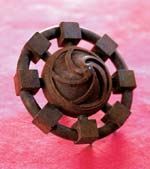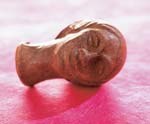Fulfilling a Dream of Moldable Wood
It smells like wood, looks like wood, and has the same mechanical and chemical properties as wood.
It smells like wood, looks like wood, and has the same mechanical and chemical properties as wood. It even has similar acoustical properties, so it could be used to make violins, for example. However, these violins would be injection or compression molded, rather than carved painstakingly by hand. Arboform, as it's called, is in fact a plastic made from wood.
The origin of Arboform goes back a few years, to 1998, when Jurgen Pfitzer and Helmut Nagele founded Tecnaro GmbH in Eisenach, Germany, with the goal of creating thermoplastics from a renewable resource. They used lignin, the rigid component in wood, which is a plentifully available waste product left after cellulose is extracted to make paper.
Pfitzer and Nagele developed their thermoplastic wood at the Fraunhofer Institute for Chemical Technology (ICT) in Pfinztal, Germany, in 1996. Two years later, the Institute spun its lignin-based Arboform thermoplastic off to Tecnaro for commercial development. Patents are jointly held by Tecnaro and Fraunhofer ICT.
Arboform consists of a pelletized mixture of thermoplastic lignin with flax, kenaf, and other natural fibers. It has a water content of 2% to 8% and density of 1.3 to 1.4 g/cc. Shrinkage is very low—0.1% to 0.3%—and Vicat softening temperature is 175 F. Arboform can be molded and extruded on conventional machines, but Tecnaro has not yet done any development work on extrusion.
Plentiful lignin
Last year was Tecnora's first year in commercial production. The company produced approximately 600,000 lb of Arboform and sampled some 300 firms. Tecnaro also appointed Biesterfeld Plastic GmbH, an engineering resin distributor in Hamburg, Germany, to market Arboform. As demand increases, Pfitzer says Tecnaro can increase production very rapidly. "In a half year, we can increase to 6 million lb per year," he claims. Price of Tecnaro's plastic wood is about $2.50/lb, but that could come down as production increases.
There is, after all, a nearly unlimited supply of lignin, which makes up 30% of wood by weight, the rest being cellulose fibers. The Fraunhofer ICT says the global paper industry generates some 110 billion lb of lignin annually. A small amount goes into cement and animal feed, but otherwise, nearly all of it is burned for energy.
Watches and figurines
At the K 2001 show in Germany last fall, Demag Ergotech GmbH demonstrated injection molding of Arboform. (Demag's U.S. office is in Strongsville, Ohio.) Tecnaro also showed its first two commercial applications. Lacher GmbH in Pforzheim, Germany, molds watch cases out of Arboform. Schleich GmbH in Schwabisch-Gmund, Germany, makes small figurines that look hand carved.
And now a third application is on the way. Mellert GmbH in Bretton, Germany, is developing a flashlight handle. Other applications under consideration for Arboform include automotive parts that look like wood but won't warp or creep.
It is also possible to blend Arboform into other plastics. Arboform's appeal isn't just for its environmental properties, but also for its wood-like look and excellent dimensional stability. Indeed, some of the companies sampling it want to blend it into conventional plastics.
Related Content
-
How to Optimize Injection Molding of PHA and PHA/PLA Blends
Here are processing guidelines aimed at both getting the PHA resin into the process without degrading it, and reducing residence time at melt temperatures.
-
CJ Bio’s Amorphous PHA Demonstrates Excellent Biodegradability in Marine environment
The tests of the bioplastic, a semi-crystalline PHA and a PLA were conducted by the national Korean testing agency (KCL)
-
Cling Wrap Made from Potato Waste
Australia’s Great Wrap to expand into U.S. with home compostable cling wrap and its refillable dispenser made from recycled PET bottles.











.png;maxWidth=300;quality=90)





